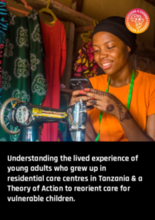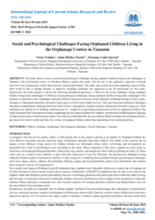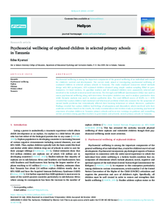Displaying 11 - 20 of 104
This mixed-methods study collects survey data from 253 adults involved with vulnerable children in Tanzania and narrative data from 31 young adults who experienced residential care during their childhood. The research fills a gap in the literature about the lived experiences of children in institutional care and the impacts of this type of care on their lives.
The study aimed to assess social and psychological challenges facing orphaned children living in the orphanages in Tanzania.
This study aimed at investigating the psychosocial wellbeing of orphaned children in selected primary schools in Tanzania.
A drive to vaccinate more than 9 million children against polio has been launched this week in four countries in southern and eastern Africa after an outbreak was confirmed in Malawi.
This webinar, informed by both detailed case studies developed by the Aga Khan Development Network and UNICEF programme implementation in Zambia with the support of the LEGO Foundation, provided a unique opportunity to engage with and understand the experiences of government, development partners, civil society, frontline health workers, and parents in Eastern and Southern Africa.
This study assessed educational opportunities and the support available to orphans and vulnerable children (OVC) in Bagamoyo District to determine socioeconomic and psychological factors that limit access to education.
This study examines how food insufficiency relates to HIV infection among caregivers of orphans and vulnerable children (OVC) in Tanzania.
This study assesses the magnitude of, and factors associated with undisclosed HIV status to a community-based HIV prevention program among caregivers of orphans and vulnerable children (OVC) in Tanzania.
In this webinar hosted by Better Care Network and the Consortium for Street Children, speakers from three NGOs presented on and discussed the care implications of COVID-19 and responses to the pandemic on street-affected children.
This study was carried out to determine the pattern of dermatological conditions and contributing factors among children living in orphanages in Dar es Salaam, Tanzania.





